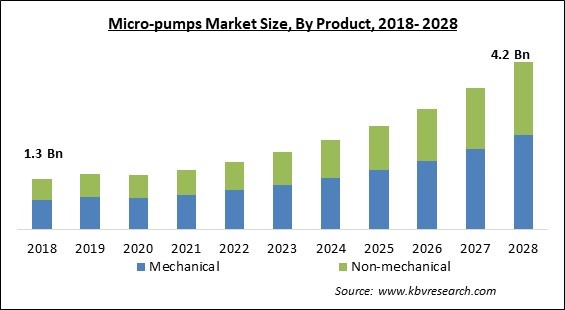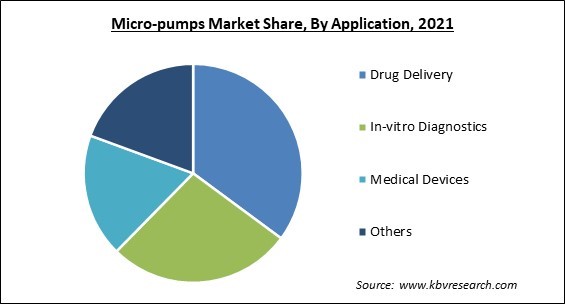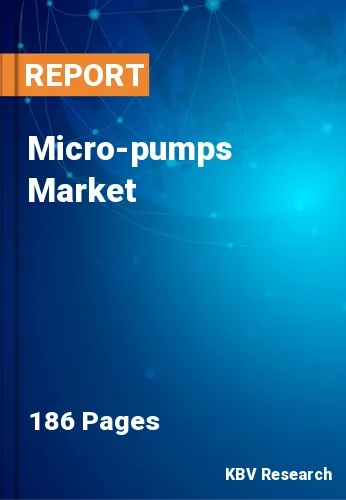The Global Micro-Pumps Market size is expected to reach $4.2 billion by 2028, rising at a market growth of 16.3% CAGR during the forecast period.
A small fluid delivery system called a micro pump creates flow at a constant pressure. Smaller than conventional pumps, micro pumps can transfer fluid with ease from one place to another. These tools make it easier to manipulate and regulate small fluid amounts. A different class of small pumps with functional dimensions in the micrometer range is known as a micro pump.

Micro pumps are used to regulate small amounts of fluid. Smaller pumps function differently than conventional pumps, such as centrifugal & axial pumps, and are more effective in the micrometer range. Small pumps are used for a variety of purposes, such as mixing a small number of fluids and transporting the liquid from one location to another, in addition to dispensing a precise dose of the medication. Both the micrometer range and microfluidic research use micro pumps. It is the most advanced micro - electromechanical system (MEMS) equipment and works differently from conventional pumps like centrifugal and axial pumps.
The rise of this lucrative market is mostly because of the expansion of the pharmaceutical industry, the expansion of life sciences R&D., the development & utilization of clinical trials, and the widespread application of micro-pump infusion therapy. With the aid of technique research, the availability of raw materials needed for production, and improvements in digital and electrical capabilities, Micro-pumps have developed over a very short period of time. The expansion of items in this category is also being fueled by a rise in the number of innovations in this product line.
Regular macroscopic pumps are downsized into micro pumps. These micro pumps or devices inside the pumps have dimensions in the micro range (1 x 10-6), which indicates that they are at least as small as a human hair strand in diameter (60 to 100 micrometers). A liquid or gas (fluid) is often moved from one point to another using micro pumps. Examples of contemporary applications for micro pumps include blood analyzers, inkjet printers, & implanted insulin delivery systems.
Due to restrictions in the supply chain, operations, & distribution, the market was affected by the outbreak of COVID-19 pandemic in the second & third quarters of 2020. Nevertheless, the market recovery was aided by the rising use of Micro-pumps in biomedical research throughout the pandemic period. Additionally, minimally invasive surgical procedures employ Micro-pumps. The market is anticipated to grow as a result of the increasing prevalence of chronic diseases like diabetes, cancer, & ischemic heart disease (IHD), as well as the growing elderly population.
During the forecast period, it is anticipated that increasing consumer awareness of the value of regulated drug delivery would propel the micro-pump market's expansion. Chemical substances or medications must maintain a specific concentration in order to have the desired therapeutic effect. Intoxication may result from drug concentrations that are below or above the intended limits, among other undesirable effects. As a result of this, the frequency of doses, toxicity, & drug interactions must all be taken into consideration and tailored for each patient based on their ailment.

Controlled drug release has been more difficult in the past few years due to an issue like releasing the proper amount of medications at the correct time with minimal amount of intrusion & increased demand for cutting-edge drug delivery systems. Long-term therapies, constrained therapeutic windows, intricately combined therapies, dosing schedules, & personalized dosing regimens are a few of the variables that provide a challenge to traditional drug delivery devices. These problems are being addressed through the development of micro-electro-mechanical systems (MEMS), which combine mechanical & electrical components.
The implantable pumps and catheter systems have been employed in intrathecal drug delivery systems (IDDS) to treat chronic pain. With the potential for patient-controlled bolus administration, IDDS is either a mechanical constant flow delivery system or electronically variable flow programmable device. Using an external programmer, battery-powered IDDS Micro-pumps enable noninvasive medication dose adjustments. Modern IDDS technologies support a variety of drugs. But the use of micro pumps is not as advantageous as it seems to be.
Based on the product, the micro pumps market is fragmented into mechanical & non-mechanical. In 2021, the mechanical Micro-pumps market segment dominated the micro pumps market by generating the highest revenue share. This can be ascribed to the Micro-Electro-Mechanical Systems' use of mechanical Micro-pumps (MEMS). These systems are relatively affordable, capable of monitoring diseases, simple to use, give rapid detection, & delivering medications.
On the basis of application, the micro pumps market is segmented into drug delivery, in-vitro diagnostics, medical devices & others. The in-vitro diagnostic segment procured a significant revenue share in the micro pumps market in 2021. This is because, the Micro-pumps are utilized for early illness detection, simpler monitoring, and greater customization. Additionally, there have been numerous advancements in wearable medical equipment that transfer micro fluids via Micro-pumps.
By end-use, the micro pumps market is classified into biotechnological & pharmaceutical companies; hospital & diagnostic centers, and academic & research institutes. In 2021, the biotechnological & pharmaceutical companies segment witnessed the maximum revenue share in the Micro-pumps market. This is because, such companies need Micro-pumps for biomedical research, infusion therapies & research therapies that includes vaccines. Further, the number of new drug approval has been grown. Thus, growth in R&D has resulted in high demand for micro pumps resulting in the market growth in this segment.
| Report Attribute | Details |
|---|---|
| Market size value in 2021 | USD 1.5 Billion |
| Market size forecast in 2028 | USD 4.2 Billion |
| Base Year | 2021 |
| Historical Period | 2018 to 2020 |
| Forecast Period | 2022 to 2028 |
| Revenue Growth Rate | CAGR of 16.3% from 2022 to 2028 |
| Number of Pages | 186 |
| Number of Tables | 349 |
| Report coverage | Market Trends, Revenue Estimation and Forecast, Segmentation Analysis, Regional and Country Breakdown, Companies Strategic Developments, Company Profiling |
| Segments covered | Product, Application, End-Use, Region |
| Country scope | US, Canada, Mexico, Germany, UK, France, Russia, Spain, Italy, China, Japan, India, South Korea, Australia, Singapore, Brazil, Argentina, UAE, Saudi Arabia, South Africa, Nigeria |
| Growth Drivers |
|
| Restraints |
|
Region-wise, the Micro-pumps market is analyzed across North America, Europe, Asia Pacific and LAMEA. North America region led the micro pumps market in 2021 with highest revenue share. A few factors propelling the growth of the market in the region are development including high purchasing power, significant government support for high-quality healthcare, the existence of high-quality infrastructure for clinical & laboratory research, and wide adoption of technologically advanced products.
Free Valuable Insights: Global Micro-pumps Market size to reach USD 4.2 Billion by 2028
The market research report covers the analysis of key stake holders of the market. Key companies profiled in the report include Ingersroll Rand, Inc. (Gardner Denver), KNF Neuberger GmbH, Alldoo Micropump Co., Ltd., Xiamen AJK Technology Co. Ltd., TOPS Industry and Technology Co., Ltd., Servoflo Corporation, Cole-Parmer Instrument Company, LLC (Antylia Scientific) (GTCR LLC), World Precision Instruments, LLC, Takasago Electric, Inc., and Dolomite Microfluidics (Blacktrace group).
By roduct
By End User
By Application
By Geography
The Micro-pumps Market size is projected to reach USD 4.2 billion by 2028.
Numerous Uses For Drug Delivery are driving the market in coming years, however, The Risk Involved In Using Implantable Micropump Devices restraints the growth of the market.
Ingersroll Rand, Inc. (Gardner Denver), KNF Neuberger GmbH, Alldoo Micropump Co., Ltd., Xiamen AJK Technology Co. Ltd., TOPS Industry and Technology Co., Ltd., Servoflo Corporation, Cole-Parmer Instrument Company, LLC (Antylia Scientific) (GTCR LLC), World Precision Instruments, LLC, Takasago Electric, Inc., and Dolomite Microfluidics (Blacktrace group).
The expected CAGR of the Micro-pumps Market is 16.3% from 2022 to 2028.
The Mechanical segment acquired maximum share revenue share in the Global Micro-pumps Market by Product in 2021 thereby, achieving a market value of $2.3 billion by 2028.
The North America market dominated the Global Micro-pumps Market by Region in 2021 thereby, achieving a market value of $1.9 billion by 2028.
Our team of dedicated experts can provide you with attractive expansion opportunities for your business.

